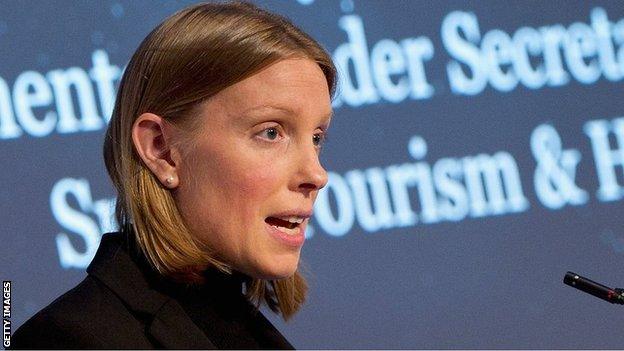Doping in sport: Criminalising drug cheats again ruled out by government
- Published

Changing the law would be "disproportionate in the battle to keep sport clean", says the sports minister
Drug cheats will not face criminal prosecution after sports minister Tracey Crouch ruled it out again.
In an official government response to a select committee report on doping in sport, Crouch said there is no reason to go against the findings of a 2017 review into criminalising doping.
That report said there was "no compelling case" to change the law.
Crouch insisted changes being made to the UK's anti-doping set-up will create "a clean and fair environment".
She said changing the law "would be disproportionate in the battle to keep sport clean", adding: "It is, however, important to note that doping in sport is already captured by existing legislation."
The Misuse of Drugs Act and the Medicines Act 1968 carry sanctions of up to 14 years imprisonment for the trafficking and supply of banned substances.
Crouch added that the government was "taking forward" other recommendations set out in the review.
These include:
Highlighting the risks of image and performance-enhancing drugs in health and education programmes through work with the Home Office and related Whitehall departments;
Pushing the World Anti-Doping Agency to make the therapeutic use exemptions process more transparent;
UK Anti-Doping control officers being able to access all sporting events, enabling random testing at competitions.
"This will help collectively provide a clean and fair environment for sport and bring reassurance to those that participate in and follow sport in the UK," Crouch said.
What did the report say?
The Digital, Culture, Media and Sport Committee published its "Combatting Doping in Sport" report in March.
It said cyclist Sir Bradley Wiggins and Team Sky "crossed an ethical line" by using drugs allowed under anti-doping rules to enhance performance instead of just for medical need.
Both Team Sky and Wiggins, who is Britain's most decorated Olympian and a Tour de France winner in 2012, "strongly refuted" the claim.
The report also claimed Lord Coe, the president of athletics' governing body the IAAF, gave "misleading" answers to parliament over when he first found out about corruption and doping allegations in athletics.
Coe told a select committee in December 2015 he was "not aware" of specific allegations of corruption in Russian athletics before they were made in a German television documentary in December 2014.
However, he said in an email to the IAAF ethics commission in August 2014: "I have now been made aware of the allegations."
Coe has denied there is any discrepancy between his evidence and what the emails say he knew.
The third section of the report criticised UK Athletics (UKA) for poor record keeping.
The committee said it was "shocked" that former UKA chief medical officer Dr Robin Chakraverty gave an injection of L-carnitine to Sir Mo Farah before the 2014 London Marathon but did not record the dose on the four-time Olympic champion's medical records.
L-carnitine is a legal supplement as long as athletes do not exceed 50ml every six hours.
- Published5 March 2018